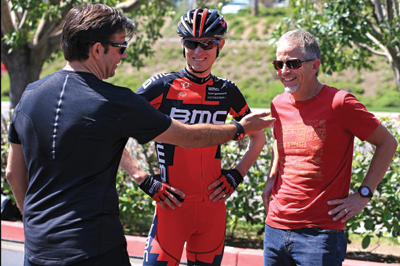USA Cycling elected entrepreneur Bob Stapleton as chairman of its board of directors this past summer. In the early ’90s, Stapleton founded the wireless company that eventually became T-Mobile USA, which sponsored two successful
 |
| Stapleton |
cycling teams in the mid-2000s. He operated both teams as cycling’s doping became public knowledge, and instituted a no-doping policy for his athletes. Correspondent Fred Dreier caught up with Stapleton to discuss the business hurdles that cycling faces.
■ It’s been two years since Lance Armstrong’s very public doping admission. How far does cycling need to go to escape its association with PED use?
STAPLETON: Cycling still does, and will for a number of years, have a heavy association with doping. The only thing that has happened in the broader sense is that other sports have joined that environment. Whether it is doping, recreational drug use or domestic violence, all of the top-tier sports have a tainted position right now. If anything, people are less sensitive to (doping in cycling), since cycling is in a similar position relative to other sponsorship alternatives.
That said, I think American cycling has a good story to tell, because we have this new crop of athletes coming up who have not experienced the same doping culture.
 |
Bob Stapleton (right) says the sponsor market in cycling is tight but that digital holds potential.
Photo by: GETTY IMAGES
|
■ How would you describe the sponsorship market in the cycling industry right now?
STAPLETON:
It’s very tight. Sponsorship has historically been associated with naming or visual rights, and that model is understood. The more interesting areas in cycling sponsorship now are in digital broadcast and other new media properties. There is a real potential to create value in the category by exploiting digital rights, which historically have been fragmented. There’s no unified platform like you have in other sports. But technology has advanced so much, and now there is a real chance to amplify the value of those rights and improve the audience product around digital streaming.
■ How do you go about unlocking those rights?
STAPLETON: There are three traditional stakeholders: teams, event organizers and governing bodies. If you can get two of those three working together, you could make it happen. Right now the rights are usually bundled with broadcast rights. At the Tour de France, for example, they send out a generic feed and every national broadcaster layers their commentary and visuals on top, so it tends to be super generic. I believe they are not culturally tuned in to the potential global audience for a streaming service. Unlocking those rights presents a huge opportunity to grow the value of sponsorships in cycling and maybe breathe some new life into the model with nontraditional sponsorships.
We are going to take that to the next level with the (2015 World Road Championships) in Richmond (Va.) by bringing GPS data and real-time athlete data into the broadcast, and by putting out a really great streaming and mobile service to complement the TV broadcast.
■ Will the big three U.S. races — the Amgen Tour of California, USA Pro Challenge and Tour of Utah — ever generate rights fees for television broadcasts?
STAPLETON: If two or all three could coordinate their selling efforts, I think they could be a very interesting proposition. You’re pounding away at this valuable demographic for three weeks. Even from a pure sponsorship or broadcast package, that is attractive. It’s something to work toward. But we ain’t there yet!
■ What role will USA Cycling play in these endeavors?
STAPLETON: We’ll continue our athlete development program, which is the best in the world. We’re going to partner with (the U.S. races) over the next year to ensure their success, so they have great spots on the international racing calendar. We want to build equity around Team USA for the Olympics and World Championships. We see a real opportunity in reconnecting people with really compelling athletes.
Fred Dreier is a writer in Colorado.






